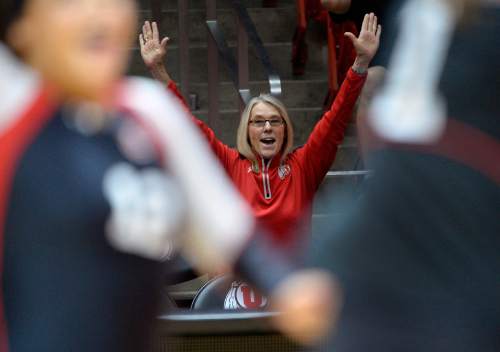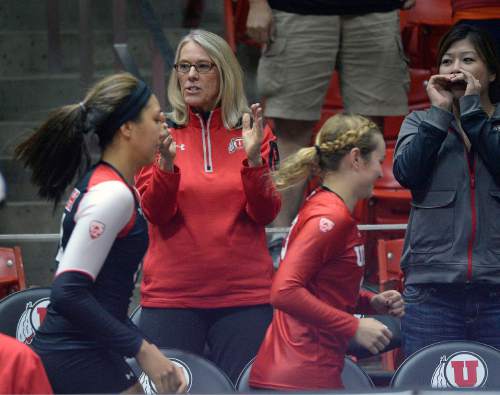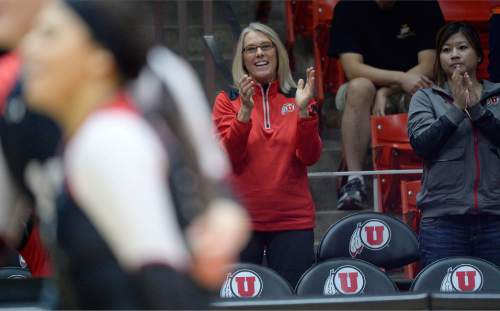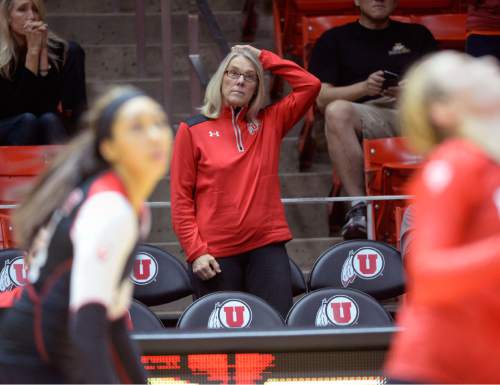This is an archived article that was published on sltrib.com in 2014, and information in the article may be outdated. It is provided only for personal research purposes and may not be reprinted.
Now that Mary Bowman is approaching the end of her University of Utah career in athletic administration, Miles Havlick is recalling his own experiences at the finish line.
Whether the result of his NCAA Championship cross-country ski race was a disappointing sixth-place finish on a rainy, miserable day in his sophomore year or a victory on a glorious, sunny afternoon as a senior, Havlick will always remember the one constant element: Bowman, there to greet him at the end.
Utah features a revolving cast of nearly 400 student-athletes, and no administrator personally has interacted with more of them or attended more of their events than Bowman, over almost two decades. Her 10-word title — senior associate athletics director, student support services/senior women's administrator — fits the job description.
As much as she'll miss her, Ute softball coach Amy Hogue is secretly happy that Bowman's value will become more appreciated in her retirement. Hogue predicts a common reaction: "She did that, too?"
Bowman agreed to become Utah's senior women's administrator in 2003, only if Ute athletic director Chris Hill would allow her to keep working directly with athletes, as in her previous role.
The new stadium where Hogue's team plays is a lasting monument to Bowman's efforts, but her true impact is less easily measured. It is registered in the experiences of all those current and former Utes she's helped — "from the high-profile athletes to the anonymous people we all have on our rosters," said soccer coach Rich Manning.
Hill hired Bowman, a former high school teacher, counselor and coach, to a new position of support services in 1996, determined to make the treatment of athletes the department's No. 1 priority. At Hill's direction, Bowman created a student-athlete wellness team, bringing together medical staff members, counselors, dietitians, sport psychologists and strength and conditioning coaches.
The department's success stories did not always start that way, as athletes have had to overcome failed drug tests, eating disorders, depression and other significant issues.
"Her office hours are 'whenever you need her,' and the athletes know that," Hogue said.
Softball player Kate Dickman, now a senior, appreciates how Bowman guided her through a difficult year as a freshman from California. "She made me feel comfortable and cared for," Dickman said, "just knowing that I had someone in the athletic department that I could talk to, if I needed to. … She's someone I'll always remember when I look back on my experience at Utah. She made my time here unforgettable."
That's only fair, because the teams Bowman-administered have done the same for her. The Ute volleyball team dedicated the 2006 season to her — and followed through with a 16-0 record in Mountain West play — after Bowman's husband, John, a high school basketball coach, died the previous summer.
"My job pulled me through," said Bowman, also crediting her two sons.
Eight years earlier, Bowman had joined in the celebration of the formerly downtrodden program's first NCAA Tournament appearance. "She's been through a lot, with a lot of programs," said volleyball coach Beth Launiere, whose team upset nationally ranked USC and UCLA in consecutive matches last weekend.
That's more evidence of the progress the Utes are making in the Pac-12, amid elite-level competition. "Their Olympic sports are unbelievable — and I love it," Bowman said. "I just hope the athletes don't lose confidence and get discouraged. I haven't seen it yet."
She's also thrilled about the Pac-12's proposals to increase benefits for student-athletes, hoping the school can sustain that level of assistance.
Bowman intends to keep working into December or January during her successor's transition period. Interviews have begun, and Hogue finds herself harshly evaluating candidates. "I've got to give somebody a chance," she said, "[but] I don't think one person can replace her."
Bowman's Lutheran-based lack of self-promotion would force her to disagree, insisting that she'll miss the people on campus more than she'll be missed. Yet Havlick, the former skier, undoubtedly spoke for hundreds of athletes when he said, "It definitely is going to be different, without her around."
Twitter: @tribkurt









